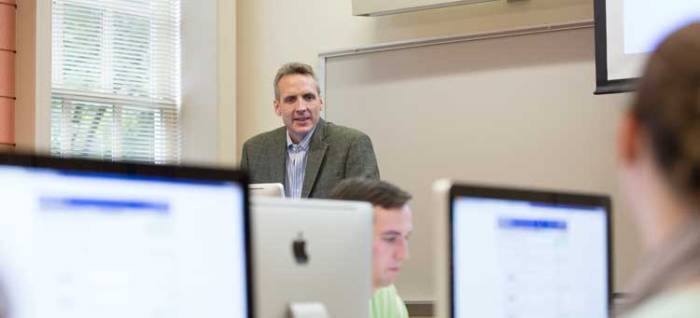Earlier this semester, Furman’s Department of Economics began advertising for a faculty position that will become open when Professor Mary Jean Horney retires at the end of the academic year.
But about three weeks ago, after the department had received more than 75 applications for the position, the university decided to call off the search for budgetary reasons, a move which will reduce the number of full-time professors in the department to eight despite the fact that more students have been majoring in economics in recent years.
The decision seems to be among the first that the university has made to address the projected budget deficit for next year, initially estimated at $6.4 million. With many at Furman expecting further downsizing, the cancelled search could be a preview of more cuts to come.
In interviews, several faculty expressed anxiety about how the budget cuts would affect them and their colleagues, and several more argued that retirement would be an important issue in discussions about how to address the deficit. Some speculated whether the cancelled search might indicate that the university will not be replacing professors who retire.
Creative writing professor Gilbert Allen will retire from the English Department at the end of the academic year, but Chair Lynne Shackelford said that, because the university has not yet committed to hiring a replacement, the department has not begun a search for a new candidate.
Faculty in at least two other departments, Religion and Modern Languages and Literature, are also retiring in the spring, but Dean of the Faculty John Beckford said that the university will continue to evaluate faculty vacancies on a case by case basis.
“This is consistent with our practice in the past, but during a time of fiscal constraints, we’ll be especially disciplined with this evaluation,” he said.
In October, the university assembled an eight-member Cost Containment Advisory Committee tasked with advising Beckford on ways to reduce academic spending, which could include eliminating programs and departments and downsizing of faculty and staff.
Beckford said the university is focusing on compensation, which he described as the “largest wedge of the budget,” and is looking into demand for programs in order to identify areas of overstaffing.
Beckford added that the university will seek to come to a decision about budget cuts as soon as possible, acknowledging that many faculty, particularly those without tenure, are anxious about how cutbacks will affect them.
“I want to do this as painless as possible,” Beckford said, noting that he hopes to share concrete plans by winter break. “We realize we’re impacting people’s lives. The most important thing in these decisions is that we don’t compromise academic quality.”
But even as the Advisory Committee continues to explore ways to cut academic costs, the university has already begun moving to address the deficit in other ways, including the possibility of cutting or reducing the hours of administrative assistants.
Mary Lou Merkt, Vice President of Finance and Administration, said via email that an assessment of the number of administrative assistants on campus compared to Furman’s peer schools “indicated a substantially larger number of administrative assistants, relative to student enrollment, here at Furman than at most of the schools surveyed.”
As a result, the university is currently offering what’s known as a Voluntary Enhanced Retirement Plan to a group of staff members, including administrative assistants, who are at least 63 years of age and have been with the university for 10 years or more. Merkt said that “no staff positions have been identified for reduction at this time.”
“Once we know how many of the staff members will elect to retire, we will evaluate our operations to determine if it would be prudent to reduce hours for some staff members, and combine or eliminate positions altogether,” she said.
Economics Department Chair Ken Peterson expressed concern about the university’s approach to administrative assistants. He said he felt that the university might not understand the range of tasks that his department’s assistant manages, which he said includes summer research, multiple budgets, communication with majors, and the department’s webpage, among other responsibilities.
Cutting or reducing hours for administrative assistants, Peterson argued, could negatively affect departments, particularly those with many programs for students.
“Our department assistant is an integral part of our team,” he said. “There could be tangible consequences that I’m not sure people realize.”
Regarding his department's loss of a faculty position, Peterson said the news “was disappointing but not surprising” and that it would be more difficult for the department to advise students and maintain course availability. The department has around 100 majors and will reduce to eight full-time and two part-time professors.
Peterson said the position cut came with the concession that the department faculty would not be required to teach First Year Seminar courses so that they can focus on core course offerings, though he said he and his colleagues are disappointed that they will not be participating in that part of the curriculum.
Still, Peterson said the Economics Department recognizes that the university is in a tight fiscal position and that holding off on the job search could help save other university jobs.
“My department understands clearly that in the short run it’s better to postpone a search for somebody that’s not yet here than to fire someone in another department that’s already here,” he said.

